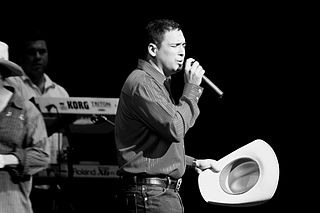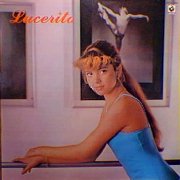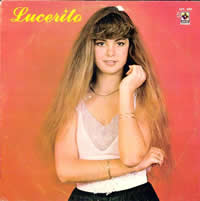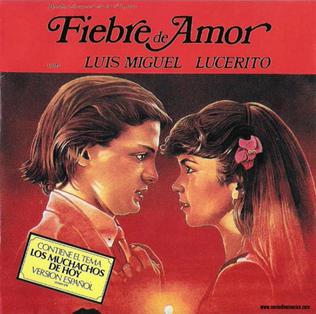
Luis Miguel Gallego Basteri is a Puerto Rican-born Mexican singer, often referred to as El Sol de México, which is the nickname his mother gave him as a child—"mi sol". Luis Miguel has sung in multiple genres and styles, including pop songs, ballads, boleros, tangos, jazz, big band and mariachi. Miguel is also recognized as the only Latin singer of his generation to not crossover to the Anglo market during the "Latin Explosion" in the 1990s.

Jose Roberto Pulido Jr., known professionally as Bobby Pulido, is an American singer, songwriter, guitarist, and actor. He is credited for introducing Tejano music to a youthful crowd and became a teen idol and one of the most influential Tejano recording artists among Mexican American teenagers.

RBD is a Mexican Latin pop group that gained popularity from Televisa's telenovela Rebelde. The group achieved international success from 2004 until their separation in 2009 and sold over 15 million records worldwide, making them one of the best-selling Latin music artists of all time. The group was composed of Anahí, Alfonso Herrera, Dulce María, Christopher von Uckermann, Maite Perroni and Christian Chávez.
Mexican pop is a music genre produced in Mexico, particularly intended for teenagers and young adults.

Amor Prohibido is the fourth studio album by American singer Selena, released on March 13, 1994, by EMI Latin. Having reached a core fan base, the label aimed to broaden her appeal with the next studio release. Finding it challenging to write a follow-up hit after "Como la Flor" (1992), Selena's brother A. B. Quintanilla enlisted the assistance from band members Ricky Vela and Pete Astudillo with writing the album's songs. The resulting album has a more mature sound featuring experimental production that blends diverse musical styles from ranchera to hip-hop music. Amor Prohibido is a Tejano cumbia album modernized with a synthesizer-rich delivery using a minimalist style that was quintessential in early 1990s Tejano music.

Lucero Hogaza León, known simply as Lucero, is a Mexican singer, actress, songwriter, and television host. She is a multi-platinum singer in Mexico and has sung in Spanish, English, and Portuguese. Lucero has sold more than 30 million records worldwide. She is often referred to as La Novia de América.
American singer Selena released five studio albums, three live albums, three boxsets, two remix albums, two soundtrack albums, and twenty compilation albums. Credited for elevating a music genre into the mainstream market, Selena remains the best-selling Tejano recording artist whose posthumous releases continue to outsell those of living musicians. Selena has sold over 30 or 40 million units worldwide, making her one of the best-selling female artists in Latin music. She was named the top-selling Latin artist of the 1990s decade by Billboard magazine.

Amor a la Mexicana is the fifth studio album by Mexican singer Thalía, released on 24 June 1997, by EMI Latin. Recorded in the Crescent Moon Studios, Miami, with producers Emilio Estefan, Kike Santander, Bernardo Ossa, Pablo Flores, Roberto Blades and Javier Garza, the album blends a variety of genres bits of cumbia, salsa, and balladry.

La Chica Dorada is the debut solo studio album by Mexican singer Paulina Rubio, released on October 20, 1992, by EMI Latin. The album was produced and directed by Miguel Blasco, and written mostly by José Ramón Flórez, Gian Pietro Felisatti and Cesar Valle. Most of the album's composition is primarily "a light and danceable pop", although it includes some elements of pop rock, new jack swing, funk and new wave. The album's title has stuck and today Rubio is known as 'la chica dorada' throughout the Spanish-speaking world.

Con Tan Pocos Años is the second album from Mexican pop music singer and actress Lucerito. It was released on 1984. The first single was "Música", which was the song that she chose to be on OTI. Once again, it was produced by Sergio Andrade through Musart Label.

Fuego y Ternura is the third studio album from Mexican pop music singer and actress Lucerito. It was released on 1985. Lucerito started to be recognized in an international level with this album. For the Spotify version of the album, the title was changed to Magia and features a different album cover and track list.

Lucerito is the fifth album from Mexican pop music singer and actress Lucerito, also it is known by the name Ocho Quince. It was released in 1988, presenting two covers, one of The Dixie Cups' Chapel of Love of the original cover in Spanish of 1965 of Mayté Gaos for the song Vete con Ella and Carole King's You've Got a Friend for Tu Amiga Fiel. It was her first album presented in a digital format.

Cuéntame is the sixth studio album released by Mexican performer Lucerito. It was released in 1989. Most of the songs included on the album were used in the film Deliciosa Sinvergüenza (1989); the album also includes a cover of The Pet Shop Boys' "It's a Sin" titled "Hojas Secas". Cuéntame is one of the biggest sellers on the singer's career, and was the album that inicitated the transition from teenager, being the last album using the diminutive Lucerito.

Con Mi Sentimiento, released in 1990, is the seventh album from Mexican pop music singer and actress Lucero, and her first album in Mariachi music with the participation of Mariachi Vargas of Tecalitlan. Since Lucero was working in the Mexican soap opera "Cuando llega el amor" this album didn't have any promotion, nevertheless the album went gold and platinum in Mexico, with sales of 250,000 copies, and it reached #9 in the Top Regional Mexican Albums in Billboard. Also represents the first time Lucero had a hit in the Hot Latin Tracks in United States as Lucero, with "Te Tuve y Te Perdi" peaking at #22. All the tracks were successful recordings of the Mexican group Los Bukis. The album was the first collaboration between Lucero and Rubén Fuentes, who produced this album, Lucero De Mexico, Cariño De Mis Cariños, among others. This is the first studio album under the name of "Lucero", since her previous albums were released under her diminutive form "Lucerito"

Siempre Contigo is the twelfth album from Mexican pop music singer and actress Lucero. It was released in 1994, selling more than 700,000 units till today in Mexico and United States. It reached #15 in Billboard Top Latin Albums.

Yuridia Valenzuela Canseco, commonly known as Yuri, is a Mexican singer, actress and television host. Yuri began her career as a teenage singer in her native country. In 1978 she released her first album titled Tú Iluminas mi Vida. She gained recognition as a result of her participation in the Oti Festival in 1980. In the 1980s and early 1990s, Yuri established herself as one of the most popular pop music singers in Mexico and Latin America. Her vocal quality and versatility allow her to be incorporated into other musical genres, ranging from pop to dance, ranchera and tropical music genres. Thanks to her success and influence, she came to be considered the "Queen of Latin Pop".

Fiebre de amor is a soundtrack album from the Mexican film of the same title. It was released in 1985 on the EMI Capitol label. Mostly is performed by Luis Miguel with a few interventions from Lucerito, his girlfriend on the motion picture. The soundtrack was also recorded in Italian.

Keiko is a special single by Lucerito, dedicated to the orca Keiko that starred in the first of the three Free Willy movies. When the whale was sold to the Reino Aventura, the label of Lucerito decided to release this single due to the fame of the whale.

This is the discography of one of the most successful and prolific Mexican singers, Lucero, as of 2010, she has released 20 studio albums and two live albums; which has so far sold over 30 million albums worldwide.

Lorenzo Antonio, is an American Latin music singer-songwriter, who is known and recognized in Mexico, the United States, and Latin America. He was raised in both Mexico and in the United States, and is fluent in both Spanish and English. Most of his songs are in Spanish, but he has released songs in English as well.

















